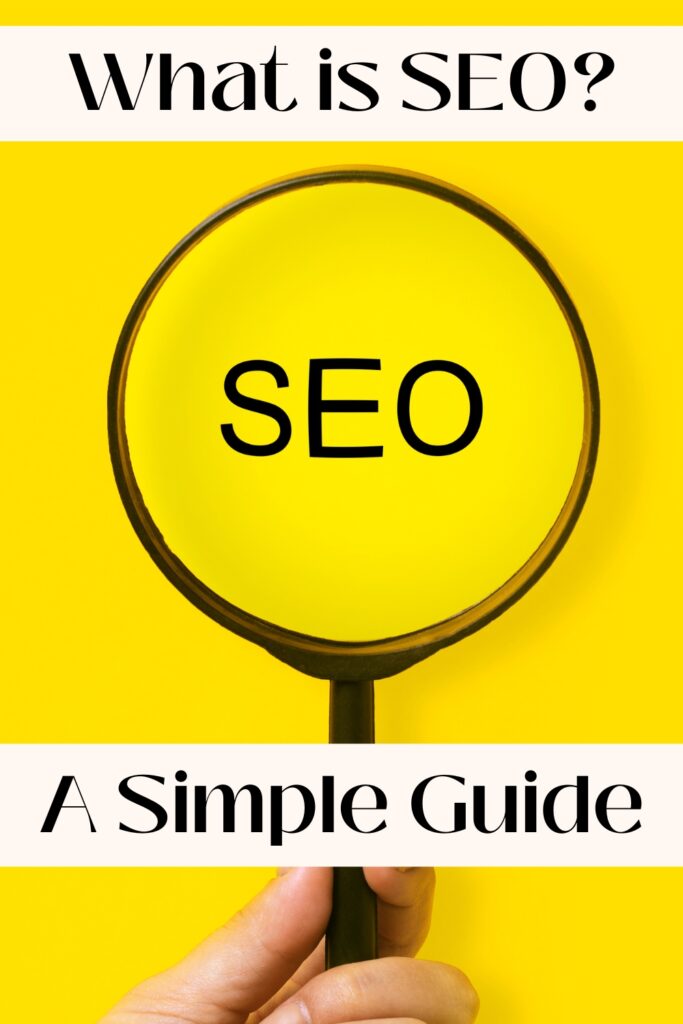SEO, or search engine optimisation, seems like a complicated and confusing term, but really it’s pretty simple!
And here, to make it even more simple are 5 key things you need to know about the basic principles of SEO.
Written for the non-technical people among us, (which, let’s be honest many of us small business owners are before we start out learning how to be successful digital marketers!), this article will breakdown what exactly SEO is, as well as a few of the key strategies required to ensure your website is optimised for search engines.
So let’s get stuck in…
Related Posts
- SEO Checklist: 10 Things You Need To Do
- How to Write the Perfect SEO Blog Post
- Beginners Guide to Keyword Research
#1 What is SEO?
SEO stands for search engine optimisation.
This term is basically a fancy way of defining the techniques and strategies used to make sure your website ranks well with search engines.
And by search engines, people are usually talking about the biggest and most popular search engine in the world, Google.
In essence then, SEO is a catch-all term website developers, content creators, copywriters, digital marketers and others refer to when discussing the framework used to get websites ranking well on search engines.
There are many different facets to SEO – some are technical, while others are more focused on content – but together they work to ensure your website appears high in search engine result pages (otherwise known as SERPs).
But, of course, we’re not just talking about any old search engine results here, we’re talking about appearing high (or ranking well) under relevant keywords; keywords that directly relate to your business and your market sector.
The principle is that potential customers and clients are likely to be searching on Google (plus Bing, DuckDuckGo and other search engines) for keywords and answers to questions that relate to the products and services you offer.
Sometimes these keywords might directly apply to the products or services themselves (i.e. best home insurance deals), and sometimes they may be based on more general enquires (i.e. things to consider buying home insurance), but the principle remains the same.
If your website can rank high in the results of these searches, then a user is likely to click on your website to learn more and is therefore also more likely to discover your brand, understand your expertise and become a future client too.
Is this way, SEO is an organic form of digital marketing.
It’s not a paid sales funnel, but one that can help you reach and capture a whole new client base.
This makes it a very powerful digital marketing strategy and if you’re not harnessing it, you’re likely to be leaving a huge chunk of potential business on the table.
But how to improve the SEO of your website?
Read on to discover the basic principles involved…
#2 Age & Authority
The first thing to know is that organic SEO is a competitive business and it’s getting more competitive by the minute!
Hundreds of sites are fighting for top positions under major keyword searches, because they know how valuable appearing in the first results delivered by search engines is.
And the first thing to know is that sites which tend to perform best are well-established sites, of a good age and a good authority.
Yes, a large part of how search engines determine which sites rank well is based on authority – a largely unknown algorithm that search engines use to assign how much power / clout / weight a website has.
Older sites, i.e. those that have been around for a few years, tend to have more authority, as do niche sites, sites with higher visitor retention, fast sites and content-rich sites.
What all of this does mean is that any new website you launch will take a while to start ranking well with search engines, so don’t expect results immediately.
That said, this is no reason to be despondent!
The sooner you get onboard and start implementing SEO, the sooner your site will begin to gain traction and start to climb those all-important search engine result pages.
All websites, even the giant players in your niche, started somewhere and implementing SEO as soon as you can, is the only way to make sure your website doesn’t miss out in the long run… which you definitely don’t want it to!
Results won’t come overnight, SEO is an organic process as we mentioned (which means it’s usually a slow burn), but there’s no better time to start than the present when it comes to getting in on the action!
#3 Keywords & Articles
So we’ve covered the basic principle that SEO essentially means ranking well in keyword searches that are relevant to your business.
In essence, keywords in this context are key terms of key phrases (otherwise known as longtail keywords) – and what we mean by this is that it’s very unlikely you’ll rank for “cheese”, but you might be able to rank for the longtail keyword “best British goat cheese”.
Sorry, we’ve got cheese on the brain!
Longtail keywords might be framed as questions, direct product request, information gathering enquires or geographical service searches i.e. hotels in St Ives.
Whatever the nature of the user’s enquiry, the words they type into a search engine are essentially keywords.
Now, making sure your website contains these keywords is crucial if you want to rank for them.
Of course, these can be within the body of the main website, as well as in the meta data of the site, but very often they are also contained within blog articles posted on your site; blog articles that directly address relevant and popular keyword searches in your niche.
There’s all sorts of additional information that’s crucial for writing SEO-targeted blog posts, which we’ve covered a lot in this article, so we won’t repeat ourselves now, but suffice to say ensuring you have keyword-focused content on your website is key in SEO.
But how to discover what keywords are popular in your market? Well the answer is simple – a paid software tool.
These amazing tools give you all sorts of vital info about keywords, including number of monthly searches, the geographical location of those searches, as well as plenty of data about your chances for ranking under that search term too.
All of which means they’re really valuable.
Learn more about our top picks for keyword research tools and how to use them in this post we wrote.
#4 Site Speed
We could go on forever about keywords, but we really want to keep this article as an overview, so we’ll move on now to discussing website speed.
Again this is another crucial factor in SEO as slow websites are not going to rank well with search engines.
And by slow websites we mean ones that take ages to load, are clunky, heavy, difficult to navigate and generally cumbersome for users.
The reason these sites won’t ever rank well on SERPs is because search engines recognise that slow websites don’t offer user good experiences. And search engines are all about serving users the best results.
The long and short of it therefore, is that speedy websites are crucial in SEO.
Website speed is affected by a range of different factors, some of which are quite technical including server load, website theme, number of plugins, sizes of images and caching.
We’ve covered all these in a post we wrote specifically about site speed – check it out here.
If you want to test your website speed, and see how it’s being scored by Google, then the free PageSpeed Insights is a great place to start.
And don’t be worried if you see all red and orange scores here – the great thing about SEO is that it’s all fixable!
#5 Backlinks
And finally, the last basic fundamental you need to know about SEO is the importance of backlinks.
You know in point #2 we talked about the authority of a website, well age, niche, speed and relevance aren’t the only criteria here.
And it doesn’t even stop at your site being denoted as high quality by search engines because it provides a good user experience and is full of in-depth, useful content i.e. top quality blog articles.
No authority is also calculated by the number of websites that link back to your site.
The higher authority of the website that links to you, the more “points” a link from that website is worth, so don’t go thinking loads of spammy backlinks is a good SEO tactic – it’s actually more likely to harm than help your website.
But good quality, relevant backlinks can be very helpful, as they are a key indication to search engines that your website is trustworthy, factually correct, reliable and useful.
Links also need to be “dofollow” to remain SEO-relevant, but we’re getting into the technical details here, which is for another time!
Instead, we’ll simply say that, when it comes to understanding SEO at a basic level, the important thing to know about backlinks is that the more organic ones you have from relevant, high authority sites in your niche, the better.
These will go a huge way to ensuring your site grows its authority and scurries up those all-important SERP ranks.
We hope that’s helped explain SEO a little and that you now have a clearer understanding of the basics involved.
If you still have any questions however, then hesitate to drop them into the comments box below and we’ll get back to you.
Want to Know More?
If you’re looking for help with your website SEO – perhaps how to improve it with a curated strategy, or for some keyword targetted articles crafted about your products or service – then get in touch with us [email protected].
PIN IT TO PINTEREST!



